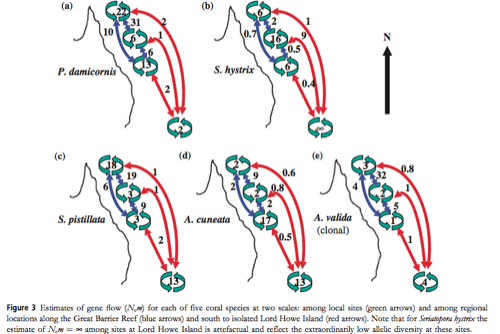The word "migration" is used in a more familiar sense of the word as meaning a periodical movement of individuals.
Migration, or gene flow, is defined in an evolutionary sense as "the transfer of alleles from the gene pool of one population to the gene pool of another population" (Freeman, Herron 225). Organisms tend to adapt to climate change by changing the geographic distribution of their environmental niche or by altering the specifics of their development and reproduction. This will lead to differences in the compositions of communities and in how they interact with one another (Hoffman). These diverging communities often have different allelic or genotypic frequencies. Gene flow or migration between two populations will help maintain similarities between the species, thus preventing (or slowing down) the process of speciation. In other words, gene flow/migration can help maintain genetic diversity in a population, but it will decrease variation between two populations.
Kirkpatrick and Barton, in their paper "Evolution of a species' range," conclude that gene flow from the center of a species' range can cause maladaptation of organisms that live toward the periphery (implying different environmental conditions) of a species' geographic range. This interference with species adaptation can prevent the species' range from expanding outward. Or even, in some extreme cases, gene flow can produce "demographic sinks" of maladapted individuals in the periphery habitats of their geographic range. Typically, stabilizing selection will act on traits and promote a certain phenotype; the phenotype selected for changes based on the geographic location and environment. Gene flow can actually inhibit this local adaptation due to the re-introduction of alleles into the population. Especially when the environment changes rapidly, this can cause an overall decrease in population size because of a failure to adapt adequately to environmental changes!
Indeed, in subsequent studies by Dawson et al., the researchers conclude that the primary cause of the northern range boundary in the volcano barnacle species Tetraclita rubescens is the "migration load." This migration load arises from the flow of maladapted alleles into the peripheral population. Migration load might be particularly important in species such as barnacles, where reproduction depends on random dispersal of gametes. The researchers infer that environmental change will continue to cause outward (poleward) expansion of geographic ranges, whereas gene flow will continue to set the boundaries on those ranges.
Scientists Ayre and Hughes studied the genotypic diversity and gene flow in several species of coral in order to predict how these species might adapt (or fail to adapt) to climate change (Ecology Letters 2004). They concluded that genetic diversity varies greatly between coral species. The species S. hystrix was found to have low gene flow among local sites and regional sites. This species also had low genetic diversity, and thus the scientists inferred that this species was descended from a very small population initially. Surprisingly, S. hystrix has a very large geographic range. Another species that they studied, S. pistillata, had an equally large geographic range, but it had opposite Fst values (high genotypic diversity). Thus, Ayre and Hughes stated that Fst and Nm values could not accurately predict the geographic range of species. To read more about their research, you can access the paper here: 

The Atlantic cod (Gadus morhua) is one such marine animal that has high gene flow in the population. Previous scientific studies have shown that low levels of genetic differentiation in geographically distinct populations has created significant differences in traits between populations of cod, ranging from "clear transatlantic differences to microgeographical population structure" between species separated only by a tens of kilometers (Nielson et al.). Researcher Einar Nielson and his team tested their hypothesis that even with high gene flow in the population(s?), Atlantic cod have still adapted to their local environment and must therefore have some signatures of this diverging selection in their genome. To test this, they used genome scanning methods to identify outlier loci (SNPs) that might be associated with adaptive traits and thus population divergence on local and transoceanic levels. The team found that these diverging loci were not generally found in only one geographic population, but rather were better associated with factors such as salinity and temperature at the spawning location and time. They concluded that despite being connected by gene flow, populations can follow independent, diverging evolutionary paths as selected for by their environmental conditions.
Back to Introduction
Comments